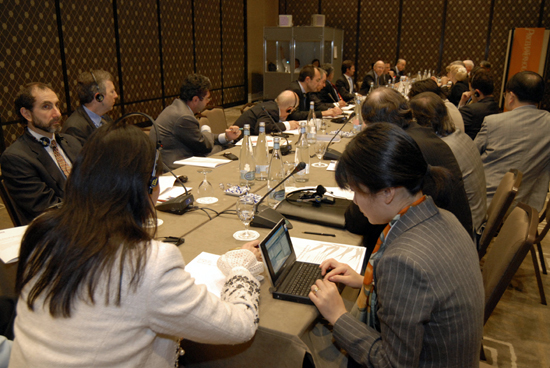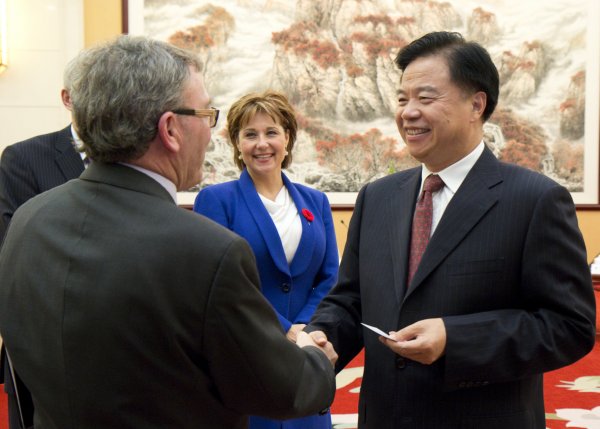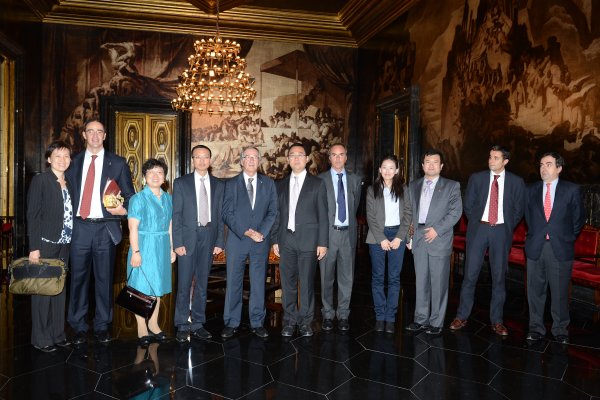Business Culture: Business Meetings
A successful meeting will begin with an opening statement and end with a clear statement of interest. Prior to the meeting, an intermediary from your own country will be useful, and your intermediary may also serve as your interpreter. A Chinese leader will direct the meeting. Upon introductions, the interpreter will introduce the Chinese team leader to you; shake hands briefly and lower your gaze (this is a sign of respect). Remain polite and maintain an air of formality throughout the meeting. A successful meeting will be the result of patience and the maintenance of friendly correspondence.
Preparation
It can be very useful to have a Chinese contact from your own country who can introduce you to potential connections in China and obtain background information on them, as well as helping you understand the culture. The contact should send an advance letter introducing your company and explaining your proposal. If you do not already have such a contact, you can request that your country’s embassy or consulate provide you with a list of appropriate businesses; it is helpful to have the consul or another official introduce you if possible. A letter of recommendation from a respected source can also help open many doors.
Set meetings in China well in advance, and reconfirm your schedule once you are in the country, always allowing for last-minute changes. Send your Chinese counterparts a list of those who will be attending from your company, including their job titles and relative positions or responsibilities on the team, as well as general background information about your company, translated into Chinese.
You will probably use the services of an interpreter in China, but it will be a point in your favor if you can learn a few basic phrases in Chinese. These are some of the most important ones (you may want to ask a native speaker for help with pronunciation, or use one of the many online sites that give audio recordings of these and other phrases):
| English | Mandarin |
|---|---|
| Hello | ni hao |
| Hello | ni hao |
| How are you? | ni hao ma |
| Goodbye | zai jian |
| Good morning | zao shang hao |
| Good evening | wan shang hao |
| Thank you | xie xie |
| You’re welcome | bu yong xie |
If possible, have a native Chinese contact help you learn the correct pronunciation of the names of those you will be meeting with.
China is highly bureaucratic, and you will find that things progress far more quickly and smoothly if you can build a relationship with government functionaries. It is therefore advisable to try scheduling meetings with them and not only with your business counterparts.
Scheduling
Business hours are generally Monday through Friday, 8am to 5pm, with a long lunch break, during which people may go home to rest. In the summer, the midday break may be extended, and the workday will continue longer. Chinese national holidays include New Year’s (Jan. 1, but usually a holiday of two days); Chinese New Year/Spring Festival (the first three days of the new moon that falls between Jan. 21 and Feb. 21—check an online calendar for the exact dates each year); Labor Day (May 1, but celebrated over three days); and National Day (October 1, three days).
Foreigners are expected to be punctual in arriving to meetings, although the Chinese may not be on time, especially in governmental offices. Meetings are usually slow-paced, and time may be taken during the day for the Chinese team to retire for internal discussions. Be prepared to spend many hours over many days in both business and social meetings.
Business Attire
It is usual for both Chinese and foreign businessmen to wear suits and ties, generally in dark colors with a light shirt. Women should dress modestly, without low necklines or particularly short skirts. Red is the color for weddings and white for funerals, so dresses entirely of these colors should not be worn, and in general you should avoid loud colors. Jewelry should not be ostentatious.
In informal settings, jeans are popular for both men and women, but shorts are not commonly worn in public.
Meeting Protocol
Initial meetings follow a formal protocol in which the leader of the Chinese team makes a statement of welcome, after which you should briefly present the outline of your proposal and take questions (detailed discussion will wait for later negotiations). The Chinese leader will make a closing statement, and you should thank the Chinese and express your commitment to working together before shaking hands and leaving.
An interpreter will usually be present even if the Chinese do speak English, but you should speak directly to the Chinese, in particular the leader, not to the interpreter. In general, the senior Chinese negotiator will chair the meeting, and your team leader should speak on behalf of your group or direct others to do so.
Entering the Meeting Room: Hierarchy
Whether you are entering a conference room for a meeting, or a restaurant for a banquet with your Chinese hosts, the person with most seniority or the head of your delegation should be the first to go in, followed by subordinates, in order of importance. Hands should be shaken and introductions made in this order also. Both elders and superiors are treated with special deference in China.
In business meetings, the Chinese team will sit on one side of the table, with the highest-ranking executive in the center; your visiting delegation should organize yourselves similarly on the other side.
Your hosts will respectfully invite you to leave the room first, and will accompany you to the exit.
Introductions
It will usually be the role of the interpreter or a junior partner to introduce the Chinese team leader to you; that person will then introduce the rest of the team. You should shake hands briefly with each person, not overly firmly, especially with superiors. Say "ni hao" (hello, pronounced "nee how") and keep your eyes lowered as a sign of respect.
Forms of Address
It is unlikely that you will be invited to use anyone’s given name; you should refer to them as Mr. or Ms., or by their job title, followed by their family name. Remember that in China, a person’s family name comes before their given name, so someone who is introduced as Zhang Wenqiang should be addressed as Mr. Zhang.
Another common form of address is use of the terms Âlao (honored elder) or xiao (honored young one) before the family name.
Business Cards
Business cards are presented and received with both hands. One side of your card should be translated into Chinese. Hold your card by the upper corners between the thumb and forefinger, and always remember to present it Chinese-side up. When you receive a card, you should take a few moments to look at it and then put it carefully away—it would be considered rude to leave it lying around.
Body Language
Chinese stand quite close together when talking, which may be uncomfortable to Westerners, but don’t back away—your Chinese counterpart will simply move closer again. While seated, you should always keep both feet on the floor (don’t cross your legs) and sit straight.
Prolonged, direct eye contact with superiors or anyone you don’t know well is considered aggressive; lowered eyes are a sign of respect.
Although shaking the head means "no" as in many other countries, the negative may also be expressed by shaking the hand from side to side. Nodding the head can mean "yes" or a general acknowledgement. Be careful: shrugging the shoulders is not understood as "I don’t know" but rather as a sign of distain. Do not indicate a person with your head or foot or point with a single finger—use the whole hand. Similarly, beckon with the hand turned palm-down and a "scratching" motion, not with a finger.
The Chinese tend not to show their emotions by gestures or even facial expressions; this is a cultural norm, not a display of coldness or disinterest as it may appear to foreigners (although it can also sometimes be a tactic in negotiations to induce the other side to be more forthcoming).
Meeting Starters: Small Talk versus "Getting Down to Business"
Meetings should begin with some small talk: your Chinese hosts may ask about your trip, your hotel, and similar matters, and spend a little while in general discussion of non-controversial topics. It would not be polite to press on to business before your host is ready to do so. Social settings, such as a banquet at a restaurant, may be used to get to know you better. Be aware that the Chinese often ask questions about things that you may consider personal, such as your age, your income, or what you paid for your watch or shoes. They will be happy to discuss culture and history, but not topics such as politics and human rights: not only can these be controversial, and therefore damaging to the friendly relationship with you, but expressing opinions critical of government policy can get your Chinese counterparts in trouble with the authorities.
Conducting the Meeting
Even when there is a team from each side, in reality negotiations are carried out by the leaders of each, who coordinate and direct the discussion, requesting information or opinions from their subordinates as necessary. It is preferable to agree on an agenda in advance of the meeting and to follow it, although this is not necessary.
You should remain polite and somewhat formal throughout negotiations. Disagreement or negative answers should be expressed delicately or by remaining silent. Presentations should be impressive and give plenty of detail, although you need not disclose information that may be of advantage to you at a later date, especially technological innovations. The Chinese may well use a variety of bargaining tactics, such as padding the price, playing off competitors, or even deception, to strengthen their own position. They expect Westerners to be somewhat more direct and honest. In any case, discussions will remain soft-spoken and not directly confrontational.
Each meeting should end with a clear statement of continued interest, which will set the tone for future meetings. Summarizing any decisions made and presenting these in writing is recommended; while this is not a binding agreement, it serves to minimize misunderstandings or repetition.
Decision Making
Often the president or chairperson is an honorary leader, and the deputy or vice-head of the company will be the actual decision-maker. Subordinates at many levels will be consulted, so the internal decision-making process will take time, even after the Chinese team has discussed and negotiated with you extensively.
A contract may be a relatively short statement of principles, with the details left for subordinates to coordinate. Once a decision is reached, remember that it will still require official government approval before implementation can begin.
Gifts and Splitting the Bill
Be very careful about giving gifts in China: a gift at the beginning of a business relationship may be viewed as a bribe (which is forbidden by law), as can a gift to an individual when others are present. A gift presented by your company to theirs may be acceptable, and is best given after negotiations are finished. In the case of individual gifts, make sure that everyone of a similar rank receives a gift of the same value. Gifts are generally refused two or three times, and the giver should continue to offer. Wrapped gifts are not opened immediately. If you do not accept a gift for some reason, you will need to apologize profusely so that the giver does not lose face.
Chinese culture is full of symbols: certain numbers and colors are considered lucky or unlucky, are certain items are not given as gifts because their names sound like negative concepts. For example, red is lucky, the number four sounds like the word for death, and sharp objects symbolize cutting off a relationship. It is always wise to have someone familiar with the culture help you choose and properly present your gift.
Hosting a banquet is an acceptable form of "gift," and you should reciprocate if you have been invited. At the banquet, small gifts, such as silk ties or scarves, may be given to all guests. Generally the host should arrange in advance to pay for everyone; in some parts of China, however, local officials may arrange a welcoming banquet and expect the foreigners to pay—check with a local contact. Banquet etiquette is quite complex: once again, ask for help from your local contact ahead of time, or read up on proper behavior and the types of food involved in advance.
Be aware that it is inappropriate to invite an individual Chinese person to your hotel room or other non-public place, and can even lead to questions by the police. Entertaining is generally done in restaurants.
Follow-up
The Chinese tend to dislike deadlines and prefer to wait until everything is completely ready to their satisfaction and the time seems auspicious for implementing decisions. You should try to find out who is responsible for implementing the various parts of the deal, and to remain in contact directly with them to ensure progress. It can also be useful to have a contact in China whose job is to keep in touch with the officials who have authority over your project, and to keep abreast of any changes in the laws (a regular occurrence in China) that could affect it. Maintaining a friendly correspondence with your counterparts will ensure that you have readymade contacts for future business.
Copyright © 1993—2025 World Trade Press. All rights reserved.

 China
China 

